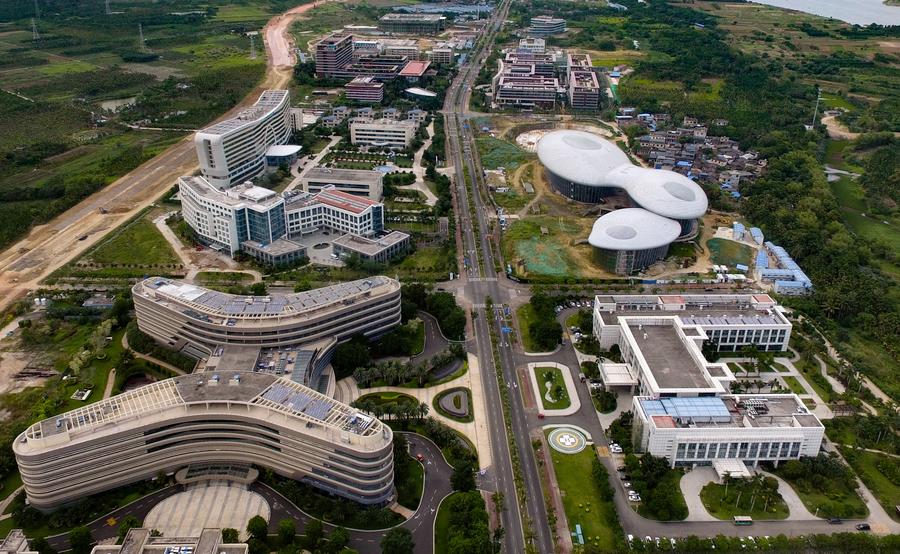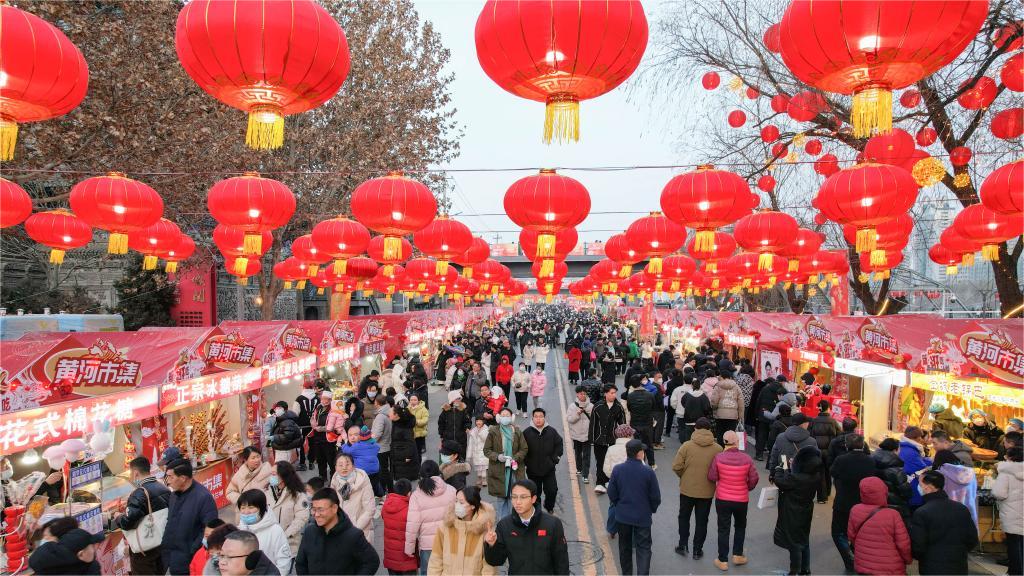China New Growth: Boao Lecheng pilot zone explores fast track into China's medical market

Aerial photo taken on April 3, 2020 shows a view of Hainan's Boao Lecheng pilot zone of international medical tourism in south China's Hainan Province. (Xinhua/Guo Cheng)
HAIKOU, Feb. 7 (Xinhua) -- Normally it would take three to five years for a foreign medical product or device to enter China's market, but in Lecheng, the country's only special medical zone on the southern tropical island of Hainan, the process takes just a few months.
The accelerators are two key preferential policies granted by the central government solely to the Boao Lecheng International Medical Tourism Pilot Zone in the city of Qionghai, allowing patients there to use medical devices and pharmaceuticals licensed abroad but not yet available in China. It also allows overseas manufacturers to gather real world data as local clinical evidence to support national registration approval.
A typical example is the Rezūm System from Boston Scientific, an innovative minimally invasive therapy designed to treat the symptoms of benign prostatic hyperplasia. Through the pathway supported by real world evidence, it took approximately four months for the company to complete the application and approval procedures, more than two and a half years quicker than the conventional pathway, and the therapy has been applied in more than 100 Chinese hospitals.
So far more than 370 original new overseas pharmaceuticals and medical devices from over 130 companies in 17 countries have been put to pilot use in Lecheng, as they are of clinical urgency and cannot be replaced by alternatives that are already available. The new pharmaceuticals and medical devices cover 28 disciplines including ophthalmology, otolaryngology, cardiology and rehabilitation.
In addition, 13 medical products and devices have been approved for sale in the Chinese market thanks to the use of real world data as an auxiliary means of clinical assessment, according to the pilot administration.
A PATHWAY LIKE NO OTHER
Jia Ning, director of the pilot zone administration, said the introduction of the new approval pathway in 2019 has raised the city's profile.
"Lecheng has had higher visibility in the industry," he said. "We have established a very important and unique pathway for international innovative medicines and medical devices to quickly enter China."
In early November, leading global biopharmaceutical company MSD, with its global headquarters in the United States, inaugurated a subsidiary in Lecheng, the first of its kind established by a wholly foreign-invested firm in Hainan.
MSD China President Anna Van Acker said the company is hoping to make full use of the favorable policies of the Hainan Free Trade Port to bring more of the latest original innovative drugs to China's market.
The pilot practices in Lecheng are part of the broader blueprint for Hainan, which aims to be a globally influential and high-level free-trade port by the middle of the century. At its current stage of development, Lecheng has already demonstrated something that is unique within China and rare in the world.
Britain, the United States and the European Union have been conducting similar explorations of using real world evidence generated from real world data to support decision-making on regulatory and healthcare technology assessment, with the relevant policies still at the pilot stage.
"At this point, it's safe to say we are advancing real world study side by side with overseas peers, if not taking the lead," Jia said.
Since 2021, the National Medical Products Administration (NMPA) has established 14 scientific research bases for drug oversight across China. Lecheng is among them, but it appears unconventional, as the others are all institutions of higher education.
It is its experiment with the real world data applications that has made Lecheng exceptional, Jia noted.
The approach being tested in Lecheng will lay a solid foundation for the NMPA to decide how to use real-world data for regulatory decision-making in the clinical evaluation of pharmaceuticals and medical devices, and the formulation of relevant guidelines, he said.
Real world study has an absolute advantage over traditional methods, because it is easier to operate and involves a shorter time-span, said Zhao Jun from the drug evaluation center of the NMPA.
New opportunities also arise for pharmaceutical companies, he said. Through real world study, companies can systematically understand broad features of patient population and clinical medication, and better identify and manage market segments and collect high-quality information on product promotion.
In the opinion of Gao Guobiao, deputy chief of the medical device evaluation center of the NMPA, the new approach is expected to bring down the research and development costs of innovative medicines and medical devices.
Such support from the regulatory authority has brightened the prospects of the pilot zone. At present, 28 medical institutions including public, private and foreign invested ones, have launched and begun operations in Lecheng, with another 20 medical institutions under construction or being planned.
GRAND VISION, SOLID EFFORT
Under a development plan for Lecheng issued in November 2019, by 2025, medical techniques, medical devices and pharmaceuticals used or developed at the pilot zone will be on a par with international best standards. By 2030, the area will become a world-class medical tourism destination and medical technology innovation center, the plan states.
Unlike the crowded and bustling hospitals commonly seen elsewhere in China, the medical institutions in Lecheng are relatively pleasing and spacious, and some high-end equipment can be spotted here.
"Lecheng's advantages lie in providing full-process solutions to support the exploration of Chinese and foreign pharmaceutical and medical device companies in China's healthcare market, such as research and development, medical product industrialization, review and production of new drugs, and innovative medical devices," Jia said. "This is what many industrial leaders have become aware of."
As doctors are relieved of the great pressure of seeing outpatients waiting in line, they have more time and energy for research and development, according to local hospital staff.
BeiGene, a science-driven biotechnology company, is preparing to launch a laboratory in Lecheng, while the Beijing Genomics Institute, a leader in genetic research, is also about to start a project here.
Before heading the pilot zone administration, Jia Ning spent years working in medical-product supervision. "Almost no foreign pharmaceutical companies came to us before the preferential policies were launched in 2019. The reasons? They had no local production, for one thing, no problems were found in pre-market quality inspection, for another," Jia recalled.
These days, the director and his colleagues are working to a tight schedule, meeting representatives of foreign medical firms, research institutions and hospitals worldwide.
At the sixth China International Import Expo in Shanghai in November 2023, a delegation from Lecheng had a very hectic week, getting acquainted with new partners from big-names like Grifols, FANCL and Cordis, as well as catching up with old friends from Novartis, Sanofi, Bayer, Roche, Johnson &Johnson, Gilead, Pfizer, Roche Diagnostics, Intuitive Surgical and Allergan.
In 2023, Lecheng has sent delegations to the United States, Singapore, Italy, Denmark, Sweden and Switzerland, reaping some fruitful results.
China's enticing huge market is a powerful driver of such activity.
Carrie Xiao, a Deloitte consulting partner, noted that, by 2030, China is expected to become the world's second largest medical-devices market after the United States, with the growth mainly driven by the rising prevalence of chronic diseases, as well as increasing healthcare expenditure due to income growth and the proliferation of healthcare providers across China.
CATERING TO PATIENT DEMAND
For Lecheng, an immediate challenge is to tap into the country's large market and keep bringing in more patients whose healthcare needs cannot be met elsewhere.
That's why on top of the innovative pharmaceuticals and medical devices that have no alternatives elsewhere across the country, the pilot zone administration has also devoted itself to adding another major benefit: good treatment experience.
Easing the anxiety of waiting is the first thing to be tackled. The pilot zone has put in place an independent regulatory regime to streamline the approval procedures. Nowadays, the waiting time has been slashed from 27 working days to three for first-time applications, while for non-first-time uses, the average wait is less than two working days.
At the country's first bonded warehouse for imported medications and medical devices in Lecheng, storage keeper Zeng Zhaoming said that, at peak time, he can handle 20,000 to 30,000 items each month.
Customs clearance at the bonded warehouse now takes less than an hour thanks to streamlined procedures, according to Lin Yong, deputy chief of the Boao Airport customs in Lecheng.
Greater efficiency in approval and customs clearance, combined with the rising fame of the pilot zone, has boosted demand for the specially licensed medications and devices.
In 2023, the bonded warehouse posted 509 million yuan (about 71.6 million U.S. dollars) in aggregate value of goods. The number of users increased by 40 percent year on year.
Official data shows that the pilot zone received 302,500 medical tourists in 2023, up 60.1 percent year on year.
The number of patients using specially licensed pharmaceuticals and medical devices at medical institutions within the zone surged 79.2 percent to 17,853 in 2022. The figure for 2023 jumped 60.5 percent year on year to 28,646.
In March 2020, to meet the growing medication demand from patients, the provincial drug regulatory authority established a temporary method for managing the use of the urgently needed imported medications outside the pilot zone. In June 2022, the method was revised to ease relevant rules.
So far, more than 10,300 patients have benefited from the policy of taking the specially licensed medications away from the zone.
Not a single case of malpractice has been found in the use of these pharmaceuticals and medical devices, thanks to a unique management mechanism that can ensure the whole-process traceability of the products, said Jia.
Photos
Related Stories
- Forum held in Hainan to boost cooperation among Chinese entrepreneurs
- 2023 Boao Forum for Entrepreneurs held in Hainan
- Roundtable on Financial Infrastructure and Services in Digital Era held during Boao Forum
- Boao forum delegates call for renewed action, cooperation to meet challenges
- Foreign leaders urge joint efforts to address global challenges at opening ceremony of Boao Forum for Asia
Copyright © 2024 People's Daily Online. All Rights Reserved.









